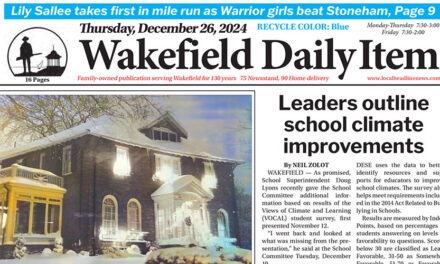This is the first in a series of articles leading up to the town election on Tuesday, April 26.
Published in the April 19, 2016 edition
By MARK SARDELLA
WAKEFIELD — With much attention being paid of late to revitalizing the downtown area, the Item asked the five candidates running for three seats on the Board of Selectmen how the town could get downtown landlords to upgrade and maintain their properties in good condition.
All of the candidates – incumbents Phyllis Hull and Ann Santos as well as challengers Dan Benjamin, Anthony Longo and Peter May — shared their views on what carrots and sticks could be used to encourage landlords to take care of their buildings.
Selectman Hull talked about some financial incentives available to downtown commercial landlords.
“Currently, the property owners can take advantage of tax increment financing, sign grants and zoning changes that would make their property more valuable, such as having apartments or condos over retail businesses,” Hull said. “The town could also offer incentives to defray the cost of some repairs and landscaping in front of businesses in order to make the downtown area look more inviting and encourage businesses to make their stores more presentable.
“We have also encouraged the use of outdoor dining to bring customers to town,” Hull noted.
“As far as requiring business property owners to take better care of their property, I would support a bylaw requiring the owners of abandoned store fronts to keep their property clean and neat and display artwork in their windows,” Hull added.
Current board chairman Ann Santos talked about offering low-interest loans and making changes to the sign bylaw.
“I am very interested in revitalizing the ‘Bank on Wakefield’ program, where local banks join together to offer business property owners low interest, easy to access loans of up to $100,000,” Santos said. “The loans could be used to improve the buildings in order to make them more attractive to customers and thus improve the vitality of the downtown.
“We also need to revisit our sign bylaw,” Santos added. “When enacted, the goal was to have attractive, uniform signage throughout Wakefield. However, the process seems to be more burdensome and onerous than first intended. Therefore, we should move to change the bylaw to be more aligned with our desire to encourage downtown businesses to thrive. I also would be interested in a more in-depth conversation regarding moving the farmers market to a location that is closer to downtown, hopefully to generate more foot traffic that could flow from the market to our businesses.
“Finally, I agree that something has to be down to incentivize our property owners to maintain an attractive storefront if their building is empty,” Santos said. “Whether it is attractive window dressing, allowing existing businesses to stage a window for advertising purposes or placing local art or art from the schools in the windows – we need to address those empty shells in a more creative way. We could enact a bylaw that requires the cleaning up and/or staging of the storefronts if vacant after a certain period of time. We also need to continue the progress we have made attracting people to the downtown, such as the Library/Jazz concerts and outdoor dining.”
Challenger Daniel Benjamin also saw value in tax incentive financing and low interest loans as well as other measures like working with the Main Street program and the local Garden Club on beautification efforts. He also favors looking at forming an association of business owners and real estate agents who know the market.
“I know many owners don’t live here and just collect monthly rents,” Benjamin said. “They must be accountable for some of these neglected eyesore storefronts. We should create bylaws to force property owners after a certain number of days (60-90) of a tenant leaving to put curtains, drapery, painting, murals, art work in their windows, doorways, etc. so we don’t have eyesore, vacated storefronts with newspaper or water-stained craft paper covering windows looking like a dump!
“A beautiful downtown creates a vibrant and busy downtown – a place shoppers want to visit and spend money,” Benjamin added. “Many of our Wakefield stores during the holidays go the extra mile with beautifully decorated stores because they have an interest and care about our community. My wife and I shop Wakefield downtown because many of those business owners are our friends and neighbors and those business owners support many activities in our town (scouts, sports, education, town events and the needy).
“We don’t have to have to have formal talks in auditoriums and halls,” Benjamin concluded. “Let’s sit on our ‘jewel’ the Common with coffee and Honey Dew local donuts and talk together. We may get things done that would surprise many experts.”
Challenger Tony Longo favored a different type of financial incentive to encourage landlords to upgrade and maintain their buildings.
“I proposed a plan in the WCAT debate in which if property owners choose to improve their property to attract business, they would have their taxes frozen for a period 3-5 years,” Longo said. “The length of time for the incentive would depend on the scope and scale of the project, such as the overall dollar value of the project and square footage. This would encourage property owners to take on larger, more ambitious projects and improvements. After the grace period ends, the actual assessment of the property would be gradually phased in over a set period of years. This plan costs the town nothing. The benefit is the additional revenue from these improvements and a revitalized downtown.
“The stick approach would be to pass bylaws that mandate that unoccupied store fronts must be kept neat and tidy,” Longo added. “Empty store fronts could be decorated to look warm, inviting and desirable. We can also have the Board of Health do monthly rodent checks, this protects any neighboring tenants. Lastly, ‘For Rent’ signs should be standard and uniform and could be provided by the Town for no cost. Any deviation from the above could result in fines to the property owners.”
Candidate Peter May shared a variety of approaches to get landlords to upgrade the look of the buildings.
“We should be willing to meet with the downtown property owners to discuss their individual concerns and the town’s,” May said. “When a tenant vacates the premises the owner should want to keep the visual aspects of the retail fronts presentable to the public and this will also help the owners lease out the space more quickly. The town should be amenable to help the property owners, as an example, by offering to have the high school art department students paint a nice mural for the widow area to keep the town more vibrant.
“Another example would be to help set up an inviting store front with the clear window space and have the interior set up like a coffee shop or another possible business setting,” May said. “That would in turn give entrepreneurs the vision to see their new business in that location.
“Another possible carrot method would be to have the town administrator and town assessor offer some tax relief/incentives if the business owner keeps up their end of the relationship by working with the town until it is occupied again.
“In regards to the structural integrity of the buildings, again we could use tax incentives through the town administrator and town assessor to help the owner physically build out a portion of the building or to help repair and maintain the building by giving them a reduced tax for a short period of time. We should concentrate on the carrot method until the property owners have stopped trying to work with us.
“On the other hand if the carrot methods do not work we could move to the other arena. This is more difficult because of our laws in the Commonwealth but we could use the power of the building inspector, health inspector to enforce current laws to entice them to comply with the beautification/maintenance of their individual property. The town has many powers to stop a business completely if the business is deemed unfit/dangerous to operate with the many laws we already have on the books.
“Actually enforcing the current laws will work very quickly in allowing the business owner to see that there needs to be a joint effort between the town/business community and its residents for everyone to succeed. The town has many powers to nudge business owners in the proper direction. We should be willing as selectman to meet with any and all property owners to hear their individual concerns and they in turn should allow the representatives of the town to be heard as well. The town can work together as a team with the property owners, business community and its residents if we have the negotiating, communication skills and courage to pursue this direction. Then it’s a win, win for the community as a whole.”




